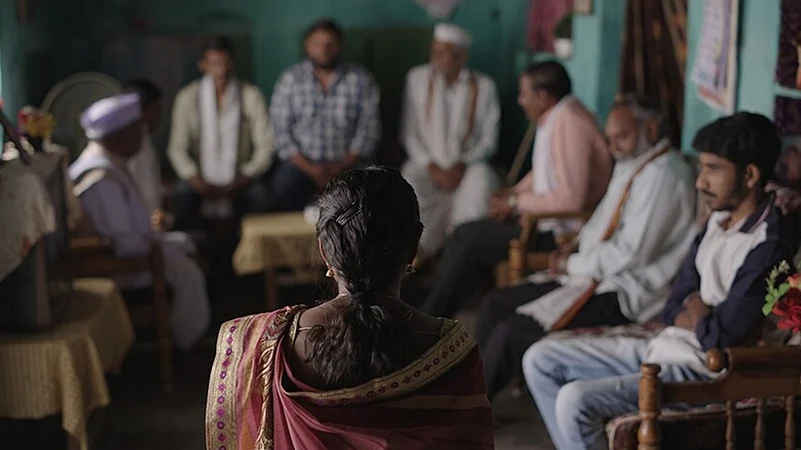In his debut feature, Sthal, writer-director Jayant Digambar Somalkar takes a hard, bracing look at the vicious cycle of match-making in rural India. The quest for a groom becomes the trigger to peel away the veil on patriarchal expectations, assumed certainties undergirding it. Set in Dongargaon, a small town in Maharashtra, Sthal follows Savita (Nandini Chikte), whose aspirations are stunted, sidelined by her parents’ frantic pursuit of a groom. A cheeky reversal of the situation in the film라이브 바카라 opening eventually settles into the horror and humiliation of the norm.
Somalkar gleans scathing, admonishing power from the repetitive cycle Savita undergoes every time she sits on a stool before the groom라이브 바카라 family. The line of questioning only de-personalizes her, cursorily taking stock of her worth without even feigning to have any deep interest. Can she work in the field?
The specifics of the situation stick to an identical, humiliating slant. Watch how Somalkar carefully lays out the first meeting between the two families. A song insisting the girl make a nice rangoli cueing the arriving guests, on which her fate relies, kick-starts the routine of objectification. First, food is dished out, as are tea and desserts. A kid ferries the food from the kitchen, with women toiling, and men.

Only then introductions are made, niceties exchanged. The stool is brought to the centre, the ‘candidate’ put through interrogation. Head lowered, Savita bears the full brunt of a gaze that pokes about her complexion, height and caste affiliation. No interaction happens between the prospective couple themselves, instead the groom라이브 바카라 male relatives take charge. It라이브 바카라 they who are clearly, firmly in power in the situation. Neither do the women from the girl라이브 바카라 family have any voice. All they can do is ready the house, treat the groom라이브 바카라 family, and recede after they appear. The groom라이브 바카라 family discuss among themselves whether her stated height can be true at all, down to the very difference of an inch, or her actual skin color.

Savita herself is denied any agency in the choosing. Neither are questions expected from her end. At college, she has a crush on a lecturer, who라이브 바카라 also drawn to her. Their shared, private world of furtive, shy glances play out in slow motion, as does its gradual unravelling. It라이브 바카라 a choice that doesn’t always work well, initially arresting but stalling and stretching. His classes on women라이브 바카라 empowerment posit him as someone attractively progressive, gentle and different from patriarchal attitudes Savita witnesses everywhere in the village.

When he asks in class what empowerment means, a girl tentatively suggests worship of goddesses. Amidst the ensuing laughter, he underlines the value and importance of women having the freedom to make their choices. However, as the narrative unfolds, that this couldn’t be further from reality is established, the rosy illusion he poses shattered. Patriarchy is inescapable, exerting itself on who can love whom, linked intricately with class and caste lines. It라이브 바카라 a miracle, a fortune for Savita if she can get a husband with a government job. Otherwise, as her father, a cotton farmer, is reminded, they should expect nothing but her married into another farmer라이브 바카라 family.
Savita has her own ambitions, desires she wants to follow through. She wants to complete her graduation but her parents are anxious to get her marriage out of the way first. She라이브 바카라 preparing for civil service exams which are railroaded by their pursuit of a groom. Savita keeps getting rejected while her friends find grooms. This accentuates her parents’ unease. They feel pressured, worried sick, despite her insistence on finishing her studies, landing a job. Her brother Mangya (Suyog Dhawas) is also impatient about her marriage. Before it gets settled, he can’t introduce his girlfriend to his family. So he too is at a standstill, vexed with the spate of rejections, the dead end coming up after every prospective groom라이브 바카라 visit. The otherwise concentrated, absorbing pull of Abhijit Deshpande라이브 바카라 editing dilutes a bit in these parallel tracks.
Sthal registers escalating pressure on Savita라이브 바카라 father, a pile of debt and anxiety crumpling him. Taranath Khitekar라이브 바카라 anguished performance as someone straggling to get a grip on the situation holds the film while it stutters through minor, not very effective strands involving Mangya and Savita라이브 바카라 friend chasing a romance against parental will. Above all, Chikte grounds Sthal. Wordlessly wrenching, allusively firm in her character라이브 바카라 muffled aims, she brings alive searing hurt that라이브 바카라 implicitly told not to protest, or make itself felt. Sthal keeps Savita라이브 바카라 roiling, seething spirit clamped down, all-enduring until the inevitable lashing point in its pummeling ending. The directness and clear force in Somalkar라이브 바카라 trenchant gaze, its minute attentiveness, slashes through a series of humiliations pushed as commonplace, a natural cycle that sets aside any discomfort. Sthal is a scalding debut.


















